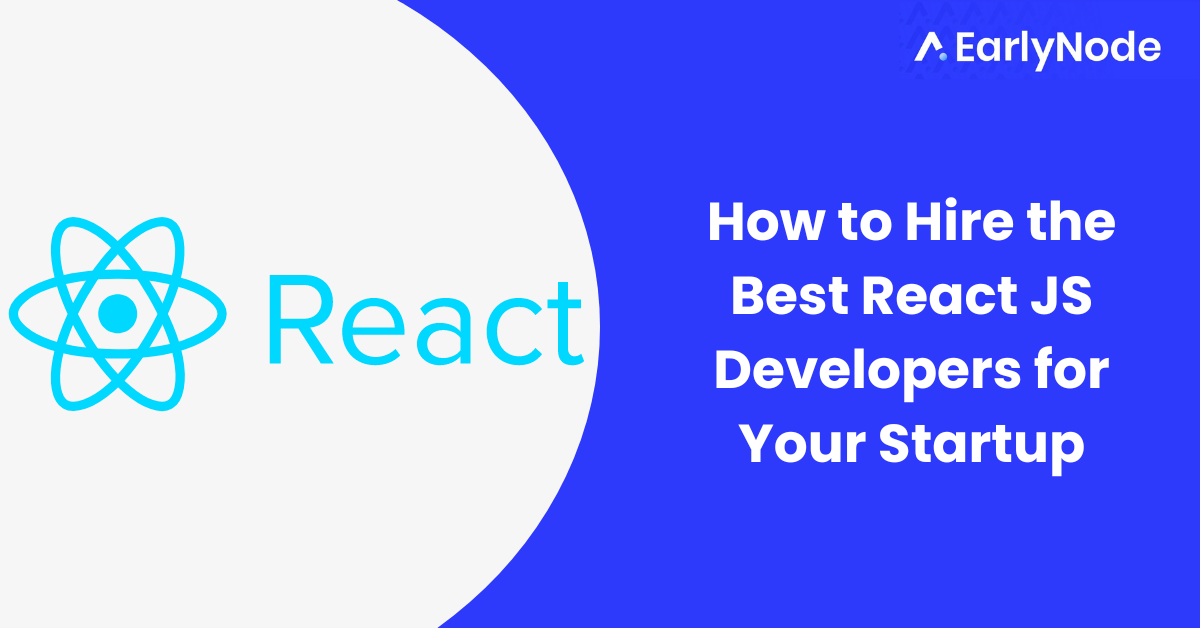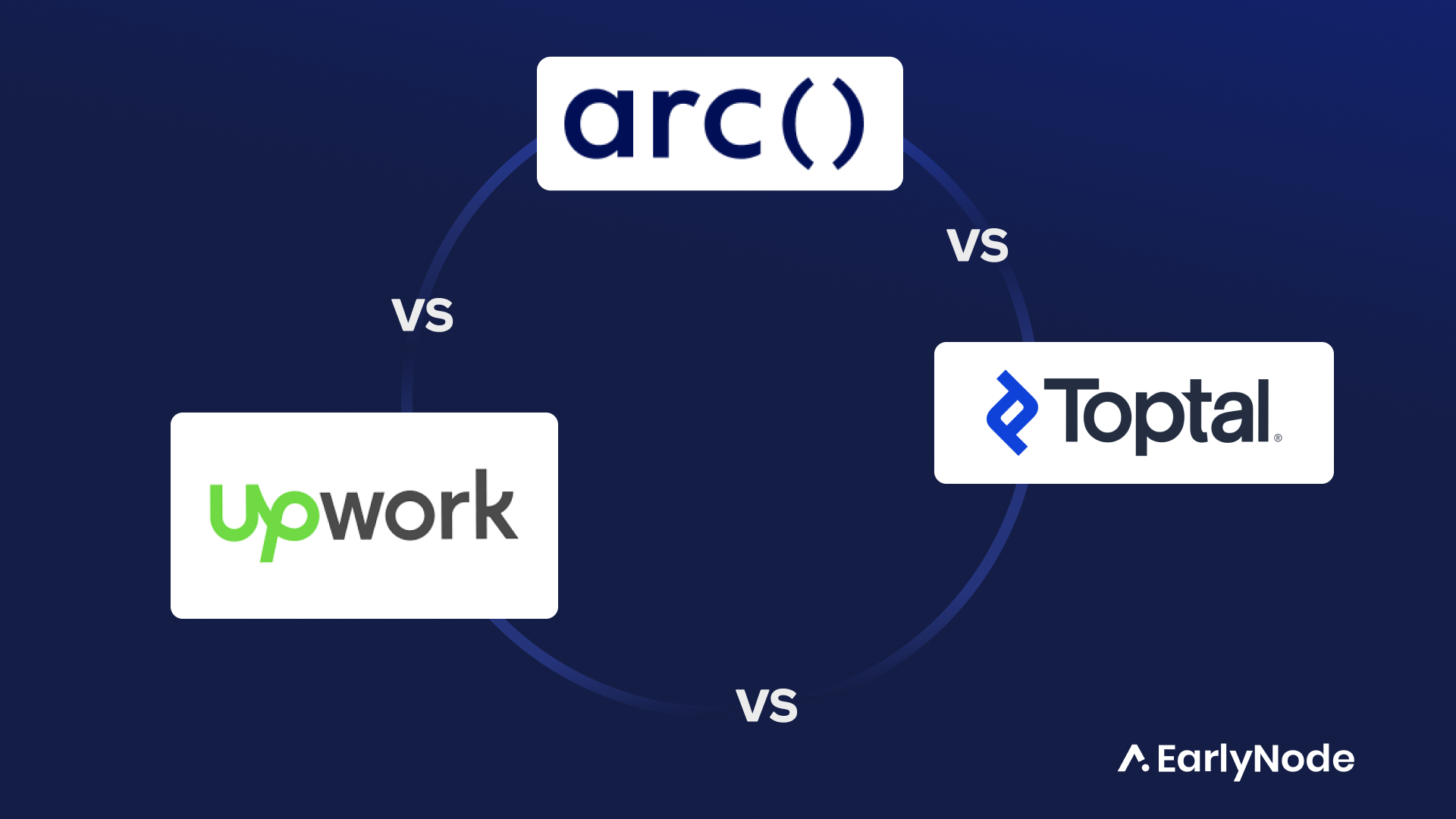How to Hire the Best React JS Developers for Your Startup

React.js has exploded in popularity since its debut in 2013 with over a million websites, including Airbnb and Netflix, adopting the framework. More and more companies are looking for talented React engineers to build user-friendly web interfaces, but it’s hard to get your hands on one. And a bad hire will waste your time and money (a startup’s most precious resources). Here’s our guide to dodging the duds and finding talent that works for you.
📋 Our 8-step Guide To Your First React Hire
🤔 Step 1: Decide your contract type: in-house vs. freelance
There are 2 main ways to hire talent these days. Each has its pros and cons:
| Pros | Cons | |
| Full-time employee | You can count on their availability Are usually highly motivated and less likely to leave even during tough times More likely to gel with the company culture | Costs more to hire and pay Costs a lot more to lay off if it doesn’t work out Recruitment takes longer |
| Freelancer | Lower labor costs Faster to recruit Could be from anywhere in the world | Takes a while to fit in with the company culture Can’t rely on their availability Very cheap freelancers are low quality |
Assess your goals and what makes the most financial sense for your startup based on the nature of the project and your resources. For example, do you need to ship a new product quickly to meet a deadline? Or do tough economic times mean you need to keep costs low?
🕸️ Step 2: Define the developer’s roles and communicate your expectations.
Communicate your expectations clearly from the start. Make sure you know exactly what you want them to achieve and how they will fit into your workflow so you know what kind of person you’ll need to hire. For example:
- What exactly will your hire be doing?
- How much progress do you expect in a week?
- How regularly will they get paid?
If you pay all your contractors at the end of the month, make sure your new hire isn’t banking on getting paid right away. Nothing sucks more than paying a developer to spend hours building something you don’t want.
🧮 Step 3: Plan the budget.
You’ve heard the saying – “You get what you pay for”. When it comes to hiring developers, it’s usually true. Budgets influence the quality of talent you can hire. You want a crazy good developer? You’d better dig deep. Need something done quick and dirty? Go bottom shelf. If you’re hiring a full-time employee, don’t forget to set aside a budget for benefits, bonuses, equipment, employer’s liability insurance, and potentially HR.
❓ Step 4: Prep for interviews.
Your interview questions should assess their technical skills, communication skills, and culture fit. These factors give you a better understanding of the person you’re adding to your team and whether they can contribute to the company’s success. Have 10 or 12 of these questions to consistently ask each candidate. Also decide whether it’s going to be a panel interview, or a one-on-one interview,
🎧 Step 5: Assess technical skills.
It’s not enough to accept what’s on the resume. You need to test that your candidate should have adequate knowledge and skills to take on your project. Here’s how:
- Get a developer from your current team to interview them: they’ll know the right technical stuff to probe.
- Set a live coding challenge or mini project to see their practical ability.
- Ask about previous projects and check out their portfolio if they have one.
👄 Step 6: Assess communication skills.
Can your candidate speak your main language fluently? How about their writing skills? Poor communication can cause problems when you work together on the project. Beyond their language skills, one helpful technique is to ask the candidate to tell you about something they’ve worked on in a simple way that a non-technical person would understand.
🌀 Step 7: Assess culture fit.
An ideal candidate will fit in with your company culture. You can look for clues in the candidate’s work history that suggest they have experience working in a culture similar to yours. You can also ask specific questions like:
- What kind of team did you work on?
- How did you handle conflicts?
- How would you cope in a fast-paced startup environment?
- What is their ideal work environment?
If you want to be thorough, contact references to see if ex-employers or colleagues have positive things to say about the candidate’s ability to fit in with a team.
Look out for red flags. For example,
- Is the candidate constantly talking about how much they hated their previous boss?
- Did they struggle to adapt to a new company culture?
This can give you insight into whether their expectations and values align with your own. If the answer is ‘yes’ to both questions, it’s probably a good idea to avoid them.
🌞 Step 8: Select and onboard
Once you’re satisfied with the best candidate for the job, provide a smooth onboarding process to integrate them into the team and get started. If it’s a permanent hire, you can start with a nice orientation. Also provide them with the necessary tools and resources, like templates, guidelines and software access to help them get started effectively.
How much does it cost to hire a ReactJS developer?
Three factors will influence the cost of hiring a ReactJS developer:
1) Contract type
2) Location
3) Experience
Permanent hires vs. freelancers
Of course, hiring an in-house developer means paying them a salary. According to Glassdoor, the average ReactJS developer in the US makes about $111,502 yearly. LinkedIn job ads normally state between $120,000 and $140,000 for senior roles. And that’s just the base salary. Permanent hires create a package of costs. For example, depending on the country, there are taxes to pay and contributions to their pensions. And since it’s a long-term commitment, you should have a budget to pay them for 6-24 months (or be comfortable laying people off).
Going the freelance route is more flexible – you don’t have to worry about pensions and other costs. But it can be even more expensive. The hourly cost to hire a ReactJS developer is around $200 for those based in the US and $100 for Europe developers. That means if a US freelancer were to work the same number of hours as an in-house developer, it would cost you around $385,000 yearly (assuming our math is right).
Location
For top developers based in North America, you’ll pay around $150 – $200 hourly. An Eastern European developer will set you back about $60 – $80, while South America ranges between $40 – $50 an hour.
Experience
Junior developers take home about $106,684 per year. Mid-level developers earn around $125,752 annually. A senior developer with at least 7 years of experience will command around $146,864 base pay. These figures go higher when you add the various perks and benefits too.
Top-5 Mistakes to Avoid while Hiring React.JS Developers
Newbie founders often make these recruiting mistakes. Either they hire rubbish or they hire talented developers who don’t fit their culture and they end up having to start again. You don’t want to be one of those (sad) newbies so before you hire, watch out for these 5 rookie errors:
1. Ignoring the culture fit
When hiring developers, attention to the culture fit is essential. Developers are often creative and independent thinkers, so you need someone who will mesh well with your culture.
Ask questions about their work style and what they like to do outside work. You’ll have a happier and more productive developer if they’re a good cultural fit.
2. Communicating poorly
If you’re not clear about what you’re looking for from the start, you end up collaborating with developers that are running in the wrong direction. Imagine the frustration. It’ll cost you time and money too.
Explain exactly what you want from them in the project, and give feedback throughout the process. Do you want the signup screen to have multiple SSOs? Say it. Do you want daily or weekly updates on how many hours they’ve worked? Let them know. Or is there a workflow tool, like Jira or Notion, that you expect them to use and update? Lay it all out there. These steps can help you hire the right developers for your needs.
3. Being blinded by shiny resumes
Resumes are handy, but they don’t say it all. You could easily miss out on true top talents while hiring ‘fakers’ with impressive resumes. Besides, people manipulate resumes to highlight certain skills and experiences all the time. That’s why you should test their skills and other abilities. You might also want to do a little digging to make sure they’re legit.
4. Underestimating the need for problem-solving skills
In product development, you’ll definitely hit a wall sometimes. Someone with critical thinking and problem-solving skills can handle the situation and minimize costly errors.
5. Undervaluing time management skills
Nobody wants talent who miss meetings, drop deadlines and rack up loads of unnecessary billable hours. Always choose someone who respects your time.
What to look for when hiring a ReactJS developer
It’s important to assess candidates on their time management, communication skills and cultural fit, but without the right technical skills, your hire won’t add any value. Getting to grips with a candidate’s experience will also help you make sure you’re matching pay to experience level. This table gives you an idea of what technical skills to expect at each level of experience for a React developer.
| Junior ReactJS developer | Mid-level ReactJS developer | Senior ReactJS developer |
| At least 1-2 years of experience | More than 2 years of experience | More than 5 years of experience |
| Familiar with the fundamentals of React | Familiar with Storybook, React Proto, Bit and other React tools Good understanding of Advanced styling (CSS Modules, Styled Components) | Knows concepts such as UX design, design thinking, web security and scalability, and web application architecture |
| Good understanding of HTML and JSX, ES6, BootStrap, JavaScript, and Git | Solid understanding of HTML, CSS, BootStrap, JavaScript TypeScript, Git, and React Hooks | Solid experience with ES6, SASS, WebPack, unit testing, Redux, and jQuery |
| Familiar with Web application architecture, Third-party libraries | Testing frameworks (Enzyme, Jest, Karma, Mocha, Jasmine, etc) |
The Best Places to Hire Full-time In-house React Developers
The best places to find full-time React developers for your in-house team is on traditional job board sites like:
- Indeed – post sponsored jobs and hire fast on-the-go.
- LinkedIn – connect with and recruit React developers.
- Technojobs – pay a premium to advertise for IT and analytics roles.
- Stack Overflow – hire from an active community of tech developers.
The Best Platforms to Hire Freelance React Developers
Niche marketplace websites
TopTal and Turing are great places to find hundreds of software developers. But there is a downside; you can’t be 100% sure of the quality you’re getting. The very best are few and almost always booked.
Moreover, some of these freelancers divide their time between multiple projects. It’s hard to find one person with the quality and availability to commit to your project.
Social Media
React LinkedIn groups and Subreddits are decent places to find talent. But be careful. Social networks are swarmed with scammers and fakers. You can also reach out to recruiters on LinkedIn, but they’ll take up to 25% commission for getting you a match.
Specialist Agencies
Specialist agencies have experienced developers dedicated to a specific technology. React.js agencies give you the chance to work with experts who fully understand what it means to work on a React.js project. They can easily spot uncommon errors and usually work faster since they’re used to the framework.
ReactSquad.io is a specialist React agency which ‘lends’ their in-house React engineers to fast-paced startups so that they get a developer embedded in their team, shipping code in less than 7 days.
Conclusion
React.js is very popular right now, which means the most talented engineers go like hot cakes. You can land quality React.js engineers for your startup without wasting time and money if you have a little bit of patience and if you look in the right places. Niche platforms and specialist React agencies are the best places to look.




